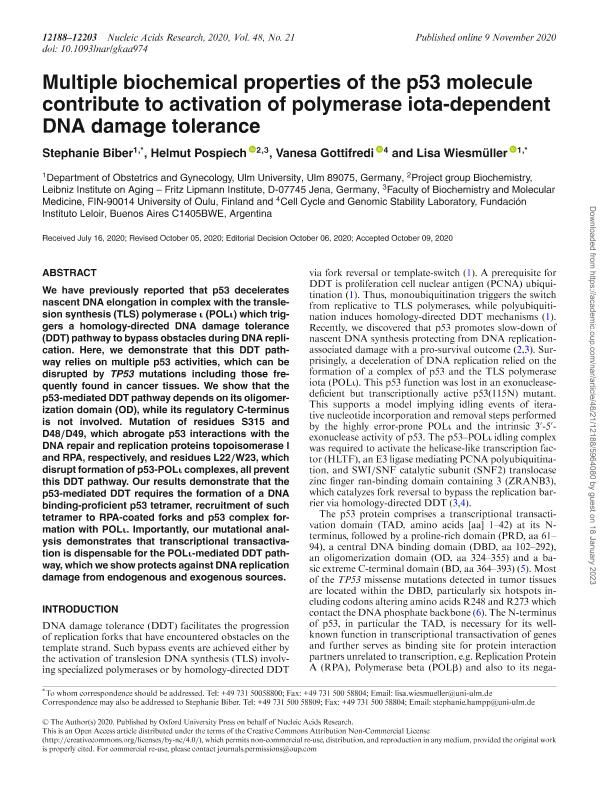Artículo
Multiple biochemical properties of the p53 molecule contribute to activation of polymerase iota-dependent DNA damage tolerance
Fecha de publicación:
11/2020
Editorial:
Oxford University Press
Revista:
Nucleic Acids Research
ISSN:
0305-1048
e-ISSN:
1362-4962
Idioma:
Inglés
Tipo de recurso:
Artículo publicado
Clasificación temática:
Resumen
We have previously reported that p53 decelerates nascent DNA elongation in complex with the translesion synthesis (TLS) polymerase ι (POLι) which triggers a homology-directed DNA damage tolerance (DDT) pathway to bypass obstacles during DNA replication. Here, we demonstrate that this DDT pathway relies on multiple p53 activities, which can be disrupted by TP53 mutations including those frequently found in cancer tissues. We show that the p53-mediated DDT pathway depends on its oligomerization domain (OD), while its regulatory C-terminus is not involved. Mutation of residues S315 and D48/D49, which abrogate p53 interactions with the DNA repair and replication proteins topoisomerase I and RPA, respectively, and residues L22/W23, which disrupt formation of p53-POLι complexes, all prevent this DDT pathway. Our results demonstrate that the p53-mediated DDT requires the formation of a DNA binding-proficient p53 tetramer, recruitment of such tetramer to RPA-coated forks and p53 complex formation with POLι. Importantly, our mutational analysis demonstrates that transcriptional transactivation is dispensable for the POLι-mediated DDT pathway, which we show protects against DNA replication damage from endogenous and exogenous sources.
Palabras clave:
P53
,
POL IOTA
,
TRASCRIPTIONAL TARGETS
,
RPA
Archivos asociados
Licencia
Identificadores
Colecciones
Articulos(IIBBA)
Articulos de INST.DE INVEST.BIOQUIMICAS DE BS.AS(I)
Articulos de INST.DE INVEST.BIOQUIMICAS DE BS.AS(I)
Citación
Biber, Stephanie; Pospiech, Helmut; Gottifredi, Vanesa; Wiesmüller, Lisa; Multiple biochemical properties of the p53 molecule contribute to activation of polymerase iota-dependent DNA damage tolerance; Oxford University Press; Nucleic Acids Research; 48; 21; 11-2020; 12188-12203
Compartir
Altmétricas




